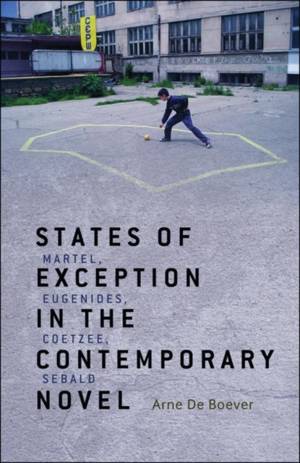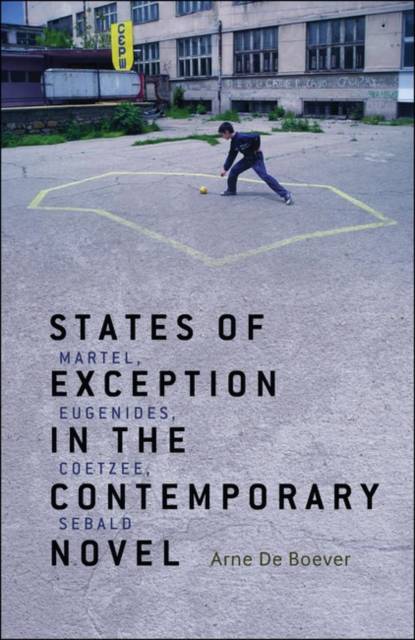
Bedankt voor het vertrouwen het afgelopen jaar! Om jou te bedanken bieden we GRATIS verzending (in België) aan op alles gedurende de hele maand januari.
- Afhalen na 1 uur in een winkel met voorraad
- In januari gratis thuislevering in België
- Ruim aanbod met 7 miljoen producten
Bedankt voor het vertrouwen het afgelopen jaar! Om jou te bedanken bieden we GRATIS verzending (in België) aan op alles gedurende de hele maand januari.
- Afhalen na 1 uur in een winkel met voorraad
- In januari gratis thuislevering in België
- Ruim aanbod met 7 miljoen producten
Zoeken
States of Exception in the Contemporary Novel
Martel, Eugenides, Coetzee, Sebald
Arne de Boever, de Arne Boever, Arne De Boever
Hardcover | Engels
€ 271,45
+ 542 punten
Uitvoering
Omschrijving
In the aftermath of the September 11 terror attacks, the political situation in both the United States and abroad has often been described as a "state of exception" an emergency situation in which the normal rule of law is suspended. In such a situation, the need for good decisions is felt ever more strongly. This book investigates the aesthetics, ethics, and politics of various decisions represented in novels published around 9/11: Martel's Life of Pi, Eugenides' Middlesex, Coetzee's Disgrace, and Sebald's Austerlitz. De Boever's readings of the novels revolve around what he calls the aesthetic decision.' Which aesthetics do the characters and narrators in the novels adopt in a situation of crisis? How do these aesthetic decisions relate to the ethical and political decisions represented in the novels? What can they reveal about real-life ethical and political decisions? This book uncovers the politics of allegory, autobiography, focalization, and montage in today's planetary state of exception.
Specificaties
Betrokkenen
- Auteur(s):
- Uitgeverij:
Inhoud
- Aantal bladzijden:
- 176
- Taal:
- Engels
Eigenschappen
- Productcode (EAN):
- 9781441125972
- Verschijningsdatum:
- 8/03/2012
- Uitvoering:
- Hardcover
- Formaat:
- Genaaid
- Afmetingen:
- 140 mm x 216 mm
- Gewicht:
- 371 g

Alleen bij Standaard Boekhandel
+ 542 punten op je klantenkaart van Standaard Boekhandel
Beoordelingen
We publiceren alleen reviews die voldoen aan de voorwaarden voor reviews. Bekijk onze voorwaarden voor reviews.









